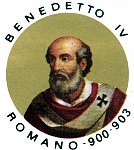 To succeed John IX another excellent man was chosen--the priest,
Benedict. Benedict was a Roman, the son of Mammalus. He had been ordained priest
by Formosus and had a high regard for that storm-tossed pope. Nothing is known
of his election, but it may be presumed that the party which favored the memory
of Pope Formosus still had the upper hand. The date of his election is not
certain, but it was some time in the first half of the year 900. Benedict seems
to have been a man of noble character. Both the author of his epitaph and the
historian Flodoard agree that he was worthy of his name. Pope Benedict was
grieved to learn that Winedmar, a henchman of Count Baldwin of Flanders, had
murdered Fulk, the excellent archbishop of Rheims.
To succeed John IX another excellent man was chosen--the priest,
Benedict. Benedict was a Roman, the son of Mammalus. He had been ordained priest
by Formosus and had a high regard for that storm-tossed pope. Nothing is known
of his election, but it may be presumed that the party which favored the memory
of Pope Formosus still had the upper hand. The date of his election is not
certain, but it was some time in the first half of the year 900. Benedict seems
to have been a man of noble character. Both the author of his epitaph and the
historian Flodoard agree that he was worthy of his name. Pope Benedict was
grieved to learn that Winedmar, a henchman of Count Baldwin of Flanders, had
murdered Fulk, the excellent archbishop of Rheims.
Benedict ordered the bishops of France to publish the
excommunication of the sacrilegious murderer. The Eastern Empire under the weak
rule of Leo VI, the Philosopher, was staggering under Saracen blows. Since the
Moslems had captured Amasia in Pontus, its bishop, Malacenus, came to Rome to
seek help from the Pope. Benedict received him with great kindness and gave him
a letter to all bishops and counts, urging them to treat the poor refugee bishop
with all consideration. The political situation in Italy after the death of
Emperor Lambert was more chaotic than ever. The North Italian prince, Berenger,
tried to get the imperial title and power over all Italy. To oppose him Adelbert
II, marquis of Tuscany, called for a more distant king, Louis of Provence. Louis
came down into Italy, defeated Berenger, and reached Rome in 901. Pope Benedict
crowned him emperor. The Pope and the new emperor got along well together. They
discussed various problems of church and state at a great meeting in a hall near
St. Peter's. But Louis was unable to make good his claim to Italy.
The next year, 902, defeated by Berenger, Louis was forced to
swear never to return to Italy. In 905 he broke his word, invaded Italy, and was
again captured by Berenger. This time Louis was sent back over the Alps without
his eyes. Hence, he is known to history as Louis the Blind. Benedict IV held a
synod in the Lateran Palace. He died sometime in the summer of 903.
Excerpted from "Popes
Through the Ages" by Joseph Brusher, S.J.

